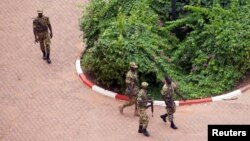Burkina Faso's military says the elite presidential guard behind a recent coup attempt is refusing to be disarmed, one of the conditions the junta agreed to in a peace deal with the army last week.
The army says the planned disarmament of the guard, known as the RSP, has reached a "dead end" because soldiers will not give up their weapons and because of "ambiguous behavior" of RSP chief and coup leader General Gilbert Diendere.
The disarmament effort began Friday, the day Burkina Faso's transitional government leaders officially disbanded the guard. According to unconfirmed news reports, the RSP is asking for guarantees of safety for themselves and their families before handing over their weapons.
Calls to mobilize
The Cabinet was expected to hold an emergency meeting Monday to discuss the situation, and civil society groups have joined transitional government calls for the general public to mobilize in protest.
By Monday afternoon, a few hundred people occupied the main square of Burkina Faso's capital, Ouagadougou, where some were chanting "Gilbert on the execution pole."
"We are here today to answer the call from the army to stay mobilized to help the army reason with the RSP," said protester Idrissa Nogo, explaining that he supports national army efforts to disarm the presidential guard.
For protester Hervé Ouattara, the refusal to yield weapons shows RSP can't be trusted and must be dealt with harshly.
"As long as the RSP and Diendéré will remain, [the people] won't sleep," he said, adding that the population will mobilize until the general is arrested and RSP is dissolved.
RSP members launched the coup attempt by arresting interim President Michel Kafando and other ministers on September 16. RSP leaders were unhappy that the transitional government barred supporters of former president Blaise Compaore from running in upcoming elections.
Compaore was ousted in a popular uprising last October, as he tried to extend his 27 years in office.
Diendere took power but was forced to step down under pressure from the army, the West African bloc ECOWAS, and demonstrating citizens.
President Kafando and Prime Minister Yacouba Isaac Zida were reinstalled as the transitional government last Wednesday.
One of the first measures taken by the transitional government during their first post-coup cabinet meeting last Friday was to dissolve the RSP and open a commission of inquiry into the coup. Violence in the wake of the coup left at least 11 dead and more than 100 injured.
Diendere has said he regretted the coup attempt.
Before the coup, Burkina Faso was planning to hold national elections on October 11. It is currently unclear when the polls will take place.





